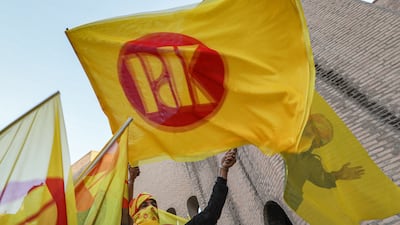The Kurdistan Democratic Party, one of the two main political groups in Iraq’s autonomous Kurdish region, will take part in the coming elections for the local parliament, the federal electoral commission told The National on Monday.
In March, the KDP announced it would boycott the elections in protest over several rulings by Iraq's top court regarding the region, labelling the judicial decisions as an infringement of its constitutional rights.
However, the KDP has now “submitted an application to express the desire to participate in the elections”, Iraq’s High Electoral Commission spokeswoman Jumana Al Ghalaie said.
The party's initial decision to boycott the elections, which were scheduled for June 10 at the time, deepened a political deadlock in the Kurdistan region. The international community has also repeatedly called for elections to be held as soon as possible.
The election was supposed to be held in October 2022 but was delayed by disagreements, mainly between the KDP and its rival, the Patriotic Union of Kurdistan (PUK).
As a temporary solution, the KDP and PUK agreed to extend the Kurdistan Parliament's term for a year to allow time for more talks over issues such as amending the election law and the sharing of tax and oil revenue.
But in May last year, Iraq's Federal Supreme Court ruled all decisions made by the regional Parliament after its extension were null and void, including one to reactivate the region’s electoral commission to oversee the ballot.
In February, the court ruled the Kurdistan region's Parliament should have 100 members instead of 111, scrapping the 11 quota seats allocated for religious and ethnic minorities, all of them belonging to the KDP.
The ruling also stipulates that Kurdistan should be divided into four constituencies instead of the single-constituency system adopted in previous votes. The elections will be overseen by the national electoral commission.
The following month, KDP said those decisions were “unconstitutional” and that it “will not partake in an illegal and unconstitutional election under an imposed system”.
Most Christian and Turkmen parties joined the decision to boycott the elections, demanding the return of their quota seats.
Last month, the elections branch of Iraq’s Supreme Judicial Council decided to allocate five seats to the minorities within the total 100 seats after a complaint filed by Christian politician Yousif Yacoub Matti, head of the Bethnahrain Patriotic Union.
According to the decision, the five seats will be divided among the following provinces: one in Duhok, two in Erbil and two seats in Sulaimani.
Iraq's electoral commission has suggested setting September 5 a new date for the vote since June 10 has been missed, Ms Al Ghalaie said.
“We are waiting now for a decree from the Kurdistan Region to set the new date for the election,” she said.


